Psychiatry is the medical specialty devoted to diagnosis, treatment and prevention of mental disorders. There was a time when using the word ‘Psychiatry’ sent wrong signals and hence, mental hospital was considered taboo while ‘Huchaaspatre’ was a derogatory term. Over the years, the way people look at mental health has changed and it is very rare now to see people with mental disorders on the roads like we used to see in the past.
Dr. Sanjay Sreenivas Chandragiri, son of city’s renowned Cardiologist Dr. C.D. Sreenivas Murthy, is practicing Psychiatry in Pennsylvania, USA, over the last two decades. He is the Distinguished Fellow of the American Psychiatric Association, Fellow of the American Society of Addiction Medicine and also the Adjunct Visiting Professor, Department of Psychiatry, Kasturba Medical College (KMC), Manipal University.
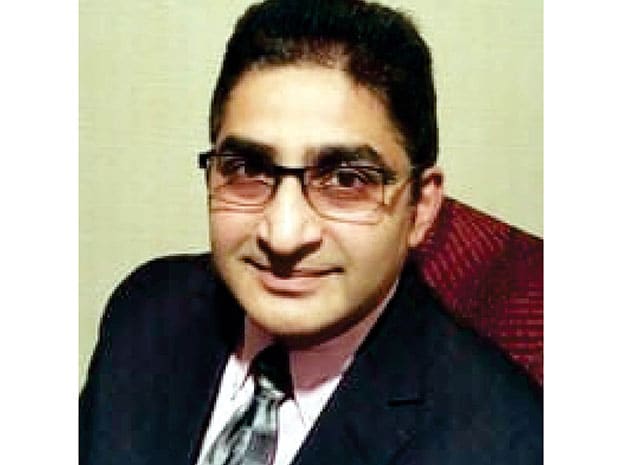
Dr. Sanjay Sreenivas Chandragiri.
Star of Mysore Features Editor N. Niranjan Nikam met the US-based Psychiatrist when he was in city recently after his talks at the KMC. In this interesting tete-a-tete, Dr. Chandragiri spoke about the development in Psychiatry, the changes in the US and India, the demand for the subject and threw light on depression. Excerpts…—Editor
By N. Niranjan Nikam
SOM: Psychiatry is all to do with man’s mental health. You have been in the field for the last 20 years in the US. Why did you choose this field which still has very less takers?
Dr. Sanjay Sreenivas Chandragiri: It is true that Psychiatry had very less takers when I chose it; the Psychiatric training positions in India would go unfilled. But now it is in great demand and actually all the positions get filled and people take it as their first choice. Why I took it is because for some reason towards the end of finishing my medical school, MBBS, I got interested, maybe, because it was interesting to read about it at that time and it somehow suited my personality.
But now, for instance in the US, it is in much greater demand than medicine or paediatrics. It has changed a lot in the last ten years and more so in the last five years.
SOM: Despite the need for more Psychiatrists in the US, mental health care, it is said, is not treated the same way as physical health. Is this true?
Dr. Chandragiri: It is both yes and no. In the US there is a greater need for Psychiatrists. But what happened is, the slot for Psychiatry were frozen for nearly 15 to 20 years. So there have been fewer programme openings and if there are openings they have not been keeping in pace with the population growth.
There has been a shortage of Psychiatrists for a long time now, where I practice. I am the Psychiatry Residency Programme Director and one of the reasons we started the programme was to increase the supply of Psychiatrists locally for us.
Mental health care, in some ways is not, but more recently now, we have mental health parity, that is, mental health care should be treated on par with physical health care. For a long time some insurance companies were not covering Psychiatric treatment. That is no longer the case. It has improved. It is not one hundred per cent there, but definitely it is a lot better.
SOM: Where does Psychiatry in India stand as there are less than 4,000 Psychiatrists in the country for a population of 1.2 billion. That is just about one Psychiatrist for over 13,000 people.
Dr. Chandragiri: I am not an expert about work-force requirement in India but 4,000 we know are very low. Again it is the same thing. But every slot gets filled and it is not that Psychiatrist PG training slots get unfilled. Everything gets filled and lots of people choose Psychiatry as their first choice, but the problem is that not enough people are being trained to be Psychiatrists.
SOM: Since you are associated with Manipal University as Adjunct Visiting Professor, Department of Psychiatry, Kasturba Medical College, what are the changes you have seen here in the last 27 years since you passed out?
Dr. Chandragiri: The changes I have seen in Psychiatry are that gradually the stigma towards seeking Psychiatric treatment has decreased. Maybe the decrease is more in the metropolitan areas and among more educated people. But I think overall the stigma has decreased and more people are seeking treatment. The quality of treatment is not just training Psychiatrists but there are other programmes like social workers for example and the training for Psychiatrists for medical students has improved a lot. At least the MCI (Medical Council of India) guidelines have changed and they require more training. Whether it is actually implemented everywhere we don’t know. But in Manipal it is implemented.
SOM: Your License is unrestricted in States of Pennsylvania. What does this kind of License mean?
Dr. Chandragiri: Oh, that just means everyone gets unrestricted license. We put that in CVs, because when you apply for a job or something, they know that it is unrestricted, that is the norm. Unrestricted License is the default license. Restricted license means you are in trouble that you might have committed something like you have over-prescribed or you did something unethical or usually for people who had substance use problems like alcohol or drug use…
SOM: Even the doctors have these problems?
Dr. Chandragiri: Yes. So if something like that happens, you lose your license for a period of time and then you have to demonstrate that you are maintaining sobriety or something like that. They may restore your license but for a year or two you have to work under someone else’s supervision.
SOM: Is this rule also there in India?
Dr. Chandragiri: I think it must be there in the rulebook. But I do not know how strictly it is enforced. There are many examples that I personally know of in the US where the Psychiatrists’ Licenses have come under restricted category where they have to go for treatment and maintain sobriety. It is usually for people with alcohol problems. If a crime is committed then the license is not going to be restored.
SOM: As Psychiatrists, do you have emergency cases like for instance you have to face as a Surgeon or even as a Physician?
Dr. Chandragiri: Yes, you do have a lot of emergencies and especially in the US it is a little more. For example, somebody may come in a very, very agitated state because they are psychotic, talking to themselves, they are out of touch with reality, have been destructive. So you have to assess and control them. Lot of times, somebody comes in, who is suicidal, very depressed and you have to make a decision whether to admit that person or you can discharge them home and they can be followed as outpatients. So those are the kind of emergencies we get.
SOM: Any examples you can share?
Dr. Chandragiri: Like a person may come in totally psychotic believing that people are trying to hurt him, hearing voices of people who are not actually there, the person’s thinking is highly disorganised and then you have to decide whether this is schizophrenia or a drug induced psychosis. Sometimes if it is what we call stimulate induced psychosis then the treatment is slightly different from the person who just came with schizophrenia. So that can happen at any time of day or night.
Where I work, we actually have a separate Psychiatric Emergency room. It is in the regular emergency room but separate part of it where we treat these kinds of patients.
SOM: But are there any separate mental hospitals like we have NIMHANS (National Institute of Mental Health and Neuro Sciences) in Bengaluru?
Dr. Chandragiri: There are. I worked for a while in a State Psychiatric Hospital. But those places are decreasing in numbers. More and more psychiatry is being treated in general hospitals.
In India though there is a separate one like NIMHANS, there are many Psychiatric Wards in many hospitals. For example in Manipal, the Psychiatric Unit is in the general hospital, I think they have one in JSS too; in Mysore Medical College again it is within the general hospital. That is the way it is being treated and Psychiatrists are trained everywhere.
SOM: What about NIMHANS?
Dr. Chandragiri: Yes, NIMHANS used to be a mental hospital but now it is a major research institute known worldwide. It has changed, its primary function is not a mental hospital. They treat a lot of mentally ill people. A long time ago, the reason was, a lot of psychiatric illnesses could not be treated. So, many of them were being kept in large mental hospitals, many times, forever. There are still some patients who may not respond to many medications, other treatments and may need longer term treatments. But the number of patients who need long term treatments are steadily decreasing because we have better treatments and better outcomes.
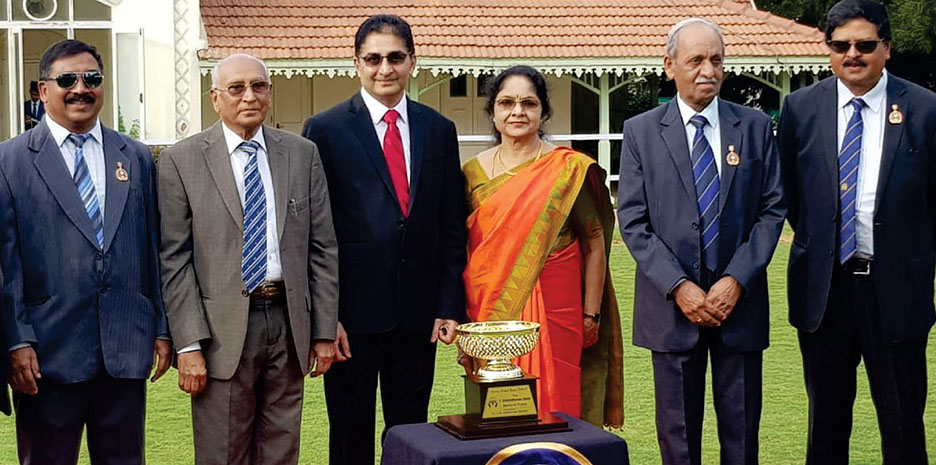
Dr. Sanjay Sreenivas Chandragiri (third from left), who recently presented The C. Dasharatharama Shetty Memorial Trophy, instituted in memory of his grandfather at Mysore Race Club (MRC), seen with (from left) MRC Steward Dr. N. Nithyanand Rao, Dr. C.D. Sreenivas Murthy, Shantha Sreenivas Murthy, Steward B.U. Chengappa and Committee Member K.N. Suresh Kumar.
SOM: You have presented a paper ‘A treatment Dilemma’ at the International College of Neuropsychopharmacology (CINP) World Congress, Vienna, Austria, in June this year. What is this dilemma about?
Dr. Chandragiri: Oh that dilemma was about a young patient who had schizophrenia, who had not responded to many different medicines. In the middle of the treatment we said we will put him on a medicine called clozapine which will treat schizophrenia. Then we had to do a blood test where we discovered that he had low platelet count and then we saw that we could not give clozapine because of low platelet count. Then we realised that with every medicine we started he would get low platelet count and when we stopped it, his platelet count would increase and then we didn’t know whether it is Idiopathic Thrombocytopenia, in which the treatment is to take out the spleen. In his case it seemed like it was drug induced because whenever a drug was given his platelet count was going down. We consulted a Haematologist and other specialists, but it was still unclear. Finally, his spleen was taken out and then the platelet count came back to normal so that we could give him this clozapine and his condition improved. And also because he had schizophrenia, he couldn’t even give consent, he couldn’t agree to the surgery. So his mother had to go to court and take power of attorney over him. We decided to submit the paper which was accepted in the World Congress.
SOM: How much of teaching and private practice are you involved in and which gives you more satisfaction?
Dr. Chandragiri: This time it is almost 50/50. Both of them give me lot of satisfaction. I teach medical students and residents and so teaching residents gives me a lot of satisfaction because with teaching you have to continuously strive to improve. In practice you still have to keep up developments but not in great depth. You have to know enough to keep using them.
For instance when I gave a talk at Manipal, one was about a treatment called TMS (Transcranial Magnetic Stimulation) that is relatively new for depression for other psychiatric conditions too but mainly for depression in which there is a big machine where you put a magnet over the head and then stimulate the brain.
SOM: Do you have this machine in Manipal?
Dr. Chandragiri: In Manipal they don’t but they have something similar to that. But I have that in Pennsylvania. It is there all over the world. Even in the US it is slowly increasing. So that means for people for whom other treatments for depression do not work, you can use that machine.
SOM: Depression is a huge problem. For instance one person who has openly talked about it is actress Deepika Padukone. In US, many celebrities have talked about depression. Tell us something about it.
Dr. Chandragiri: The important thing for people to know about depression is, it is an illness, and it is a disease just like one has a heart disease or hyper-tension, asthma. Depression happens because there are changes in your brain, the changes in how the nerve cells communicate with each other because there is some chemical imbalance.
In depression, one is feeling down, has no energy, no motivation, feels guilty about things they don’t need to feel guilty about, cannot sleep, cannot get up, and that person may be labelled as lazy, or as lacking ambition, whereas, the fact is they cannot help themselves. Many times, I think others will look at it as weakness of character.
SOM: Have you come across any celebrities and have you yourself treated any of them?
Dr. Chandragiri: Celebrities I have not, but possibly if I did I would not reveal it. But there are celebrities who have had depression and admitted to seeking treatment. The person with depression many a times may not know that he is going through depression and that may be the issue. So to remove that stigma, you should seek treatment; otherwise it will lead to bad outcomes.



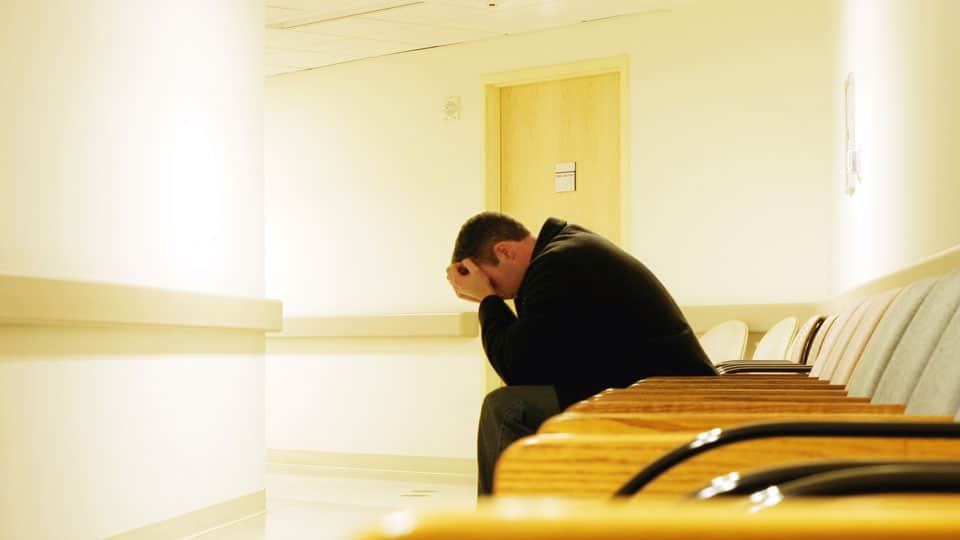
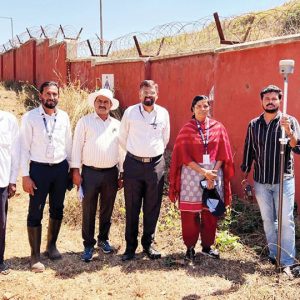

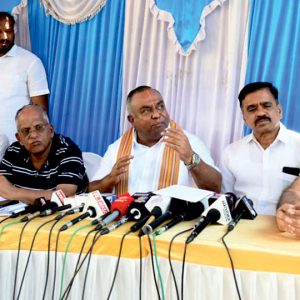

Recent Comments